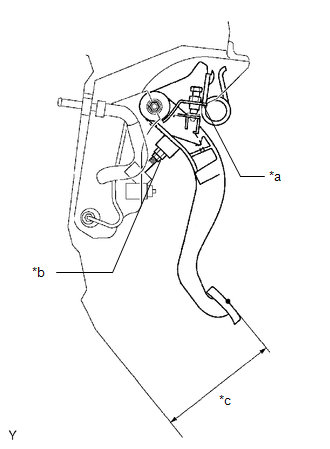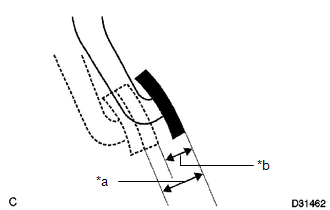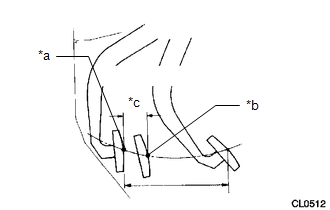Toyota Tacoma (2015-2018) Service Manual: Adjustment
ADJUSTMENT
PROCEDURE
1. INSPECT AND ADJUST CLUTCH PEDAL
(a) Fold back the floor carpet.
|
(b) Check that the pedal height is correct. Text in Illustration
Pedal height from floor panel: 178.1 to 188.1 mm (7.01 to 7.41 in.) |
|
(c) Adjust the pedal height.
(1) Loosen the lock nut and turn the clutch switch assembly until the height is correct. Tighten the lock nut.
Torque:
20 N·m {201 kgf·cm, 15 ft·lbf}
|
(d) Check the pedal free play and push rod play. Text in Illustration
HINT: Pay close attention to the change in resistance to distinguish between pedal free play and push rod play while performing the inspection. (1) Depress the clutch pedal until resistance is felt. (2) Measure the distance between the pedal's released position and the position in the previous step. Pedal free play: 5.0 to 15.0 mm (0.197 to 0.591 in.) (3) Release the pedal. Using your finger, gently press the pedal until resistance increases slightly. (4) Measure the distance between the pedal's released position and the position in the previous step. Push rod play at pedal top: 1.0 to 5.0 mm (0.0394 to 0.197 in.) |
|
(e) Adjust the pedal free play and push rod play.
HINT:
The push rod play can be adjusted by changing the length of the push rod. Pedal free play changes together with push rod play.
(1) Loosen the lock nut and turn the push rod until the pedal free play and push rod play are within the specified ranges.
NOTICE:
If pedal free play and push rod play are not within the standard range even after adjustment, inspect the related parts.
(2) Tighten the lock nut.
Torque:
12 N·m {120 kgf·cm, 9 ft·lbf}
(3) After adjusting the pedal free play and push rod play, check the pedal height.
|
(f) Check the clutch release point. Text in Illustration
(1) Pull the parking brake lever and use wheel chocks to stabilize the vehicle. (2) Start the engine and run it at idle. (3) Without depressing the clutch pedal, slowly move the shift lever to R until the gears contact. (4) Gently depress the clutch pedal and measure the stroke distance from the point that the gear noise stops (release point) up to the full stroke end position. Standard distance: 25 mm (0.984 in.) or more If the result is not as specified, perform the following procedures.
|
|
 Removal
Removal
REMOVAL
PROCEDURE
1. REMOVE CLUTCH MASTER CYLINDER ASSEMBLY
(See page )
2. REMOVE TURN OVER SPRING SEAT COMPRESSION SPRING
(a) Remove the compression spring.
...
 Installation
Installation
INSTALLATION
PROCEDURE
1. INSTALL CLUTCH PEDAL NO.1 CUSHION
(a) Install the clutch pedal No. 1 cushion to the clutch pedal sub-assembly.
2. INSTALL CLUTCH PEDAL SHAFT COLLAR
(a) Apply MP grease t ...
Other materials:
Diagnosis System
DIAGNOSIS SYSTEM
1. CHECK DLC3
(a) The vehicle ECUs use ISO 15765-4 communication protocol. The terminal arrangement
of the DLC3 complies with ISO 15031-3 and matches the ISO 15765-4 format.
Terminals No. (Symbols)
Terminal Description
Condition
Spe ...
Problem Symptoms Table
PROBLEM SYMPTOMS TABLE
HINT:
Use the table below to help determine the cause of problem symptoms. If multiple
suspected areas are listed, the potential causes of the symptoms are listed in order
of probability in the "Suspected Area" column of the table. Check each symptom by
check ...
Torque Converter Clutch Circuit Short to Ground (P074011)
DESCRIPTION
Shift solenoid valve SL is turned on and off by signals from the ECM to control
the hydraulic pressure acting on the lock-up relay valve, which then controls operation
of the lock-up clutch.
DTC No.
DTC Detection Condition
Trouble Area
SA ...



